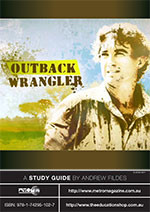Product Overview
Who is Matt Wright and why is he aggravating that crocodile, wild boar, bull and giant snake?
Well, in case you think you've heard it all before somewhere, you haven't. Not quite. Matt Wright is a working helicopter pilot rather than a professional television wildlife presenter. He flies tiny Robertson helicopters mustering cattle in outback Queensland. At least, that's how he started, but now there's so much more to his day.
Other television adventurers, like Bear Grylls, go out of their way to seek dangerous situations. The difference for Matt is that his everyday working life is more frightening than most of the scenes cooked up for other programs. He hurls his tiny helicopter around the sky and between the trees as if it is a flying motorbike; it is the new millennium drover's horse. Passengers hang on, white knuckled – only the dog looks bored.
Matt began working life as a reptile handler and spent some time in the Army Reserve; at twenty-two he trained as a helicopter pilot and took on mustering in the huge cattle stations in the far north. But a lifelong passion for wildlife soon drew him into seasonal work in conservation, relocating crocodiles and collecting their eggs. These just happen to be a couple of the most terrifying jobs on the planet and, given our fascination for crocs, are extremely watchable as well.
Wright is a natural performer and decided some years ago that he had the boyish good looks and the right style for television – he set about becoming the 'next big thing' in wildlife presenters. An American journalist discovered that his friends had nicknamed him 'Helowood', referring to his drive to become a media star. The same journalist, Richard Bangs of the Pittsburgh Post-Gazette, commented on 24 July 2006: 'I am ready to place bets that Matt Wright won't die of old age.'
Matt wrestles crocodiles and there is an obvious comparison to make between him and Steve Irwin, but he rejects it. They share the same passion for wildlife but Matt declares that he doesn't want to take his place; that it would be inappropriate. This is evident in the emphasis on his helicopter-flying and his work as a dangerous wildlife wrangler. Not until the fourth episode, when he visits Indonesia to see how they deal with crocodiles in Borneo and helps them to improve their trap design, does he step outside his normal working environment. He has a simple ecological thesis – we are restricting their habitat, they react dangerously, so it's up to us to solve the problem properly, not just kill them.
Wright works at the edge where human needs and dangerous wildlife interact. He utterly rejects the need to cull the large predators merely because they threaten livestock and people, and is driven by an ambition to seek and demonstrate alternatives. Consequently, he has developed a number of innovative techniques to control the problem, change attitudes and deal with the beasts – without losing a limb or life.
Curriculum
Humanities/SOSE/HSIE
- Outback lifestyle
- Agricultural exploitation of tropical biome
- Wildlife issues with human population pressure and interaction
- Ethical issues with dangerous wildlife control
Science – biology
- Saltwater crocodile habitat, physiology and behaviour
- Species distribution
Media studies
- Wildlife documentary techniques
- Remote and dangerous location filming
English
- Creative writing stimulus material
- Journalism – reportage and feature writing







